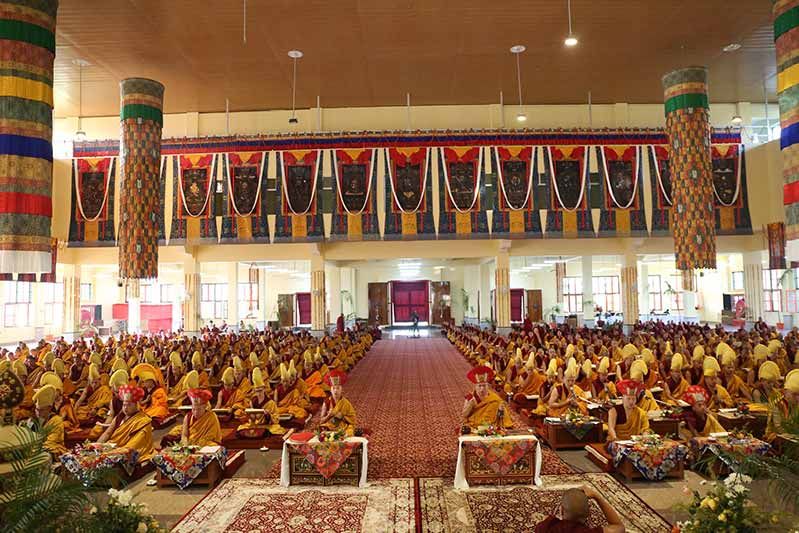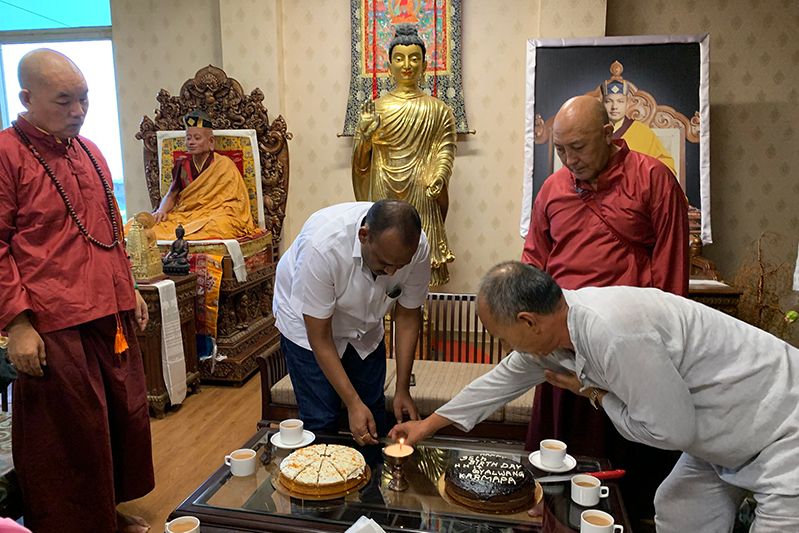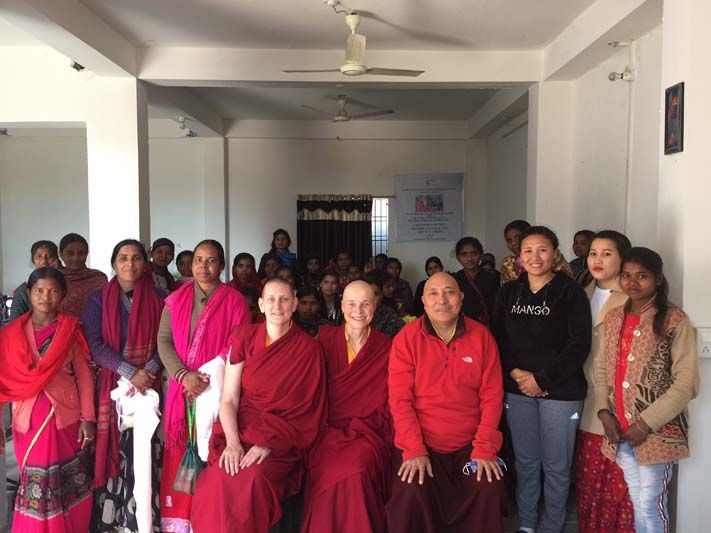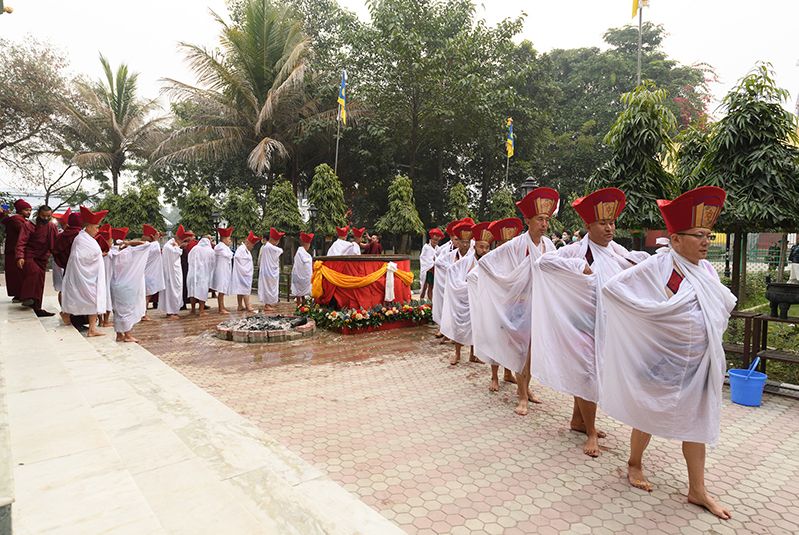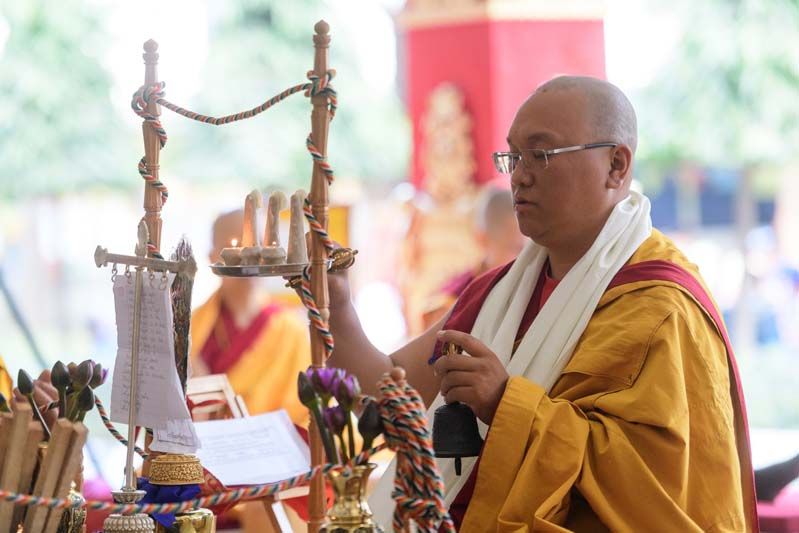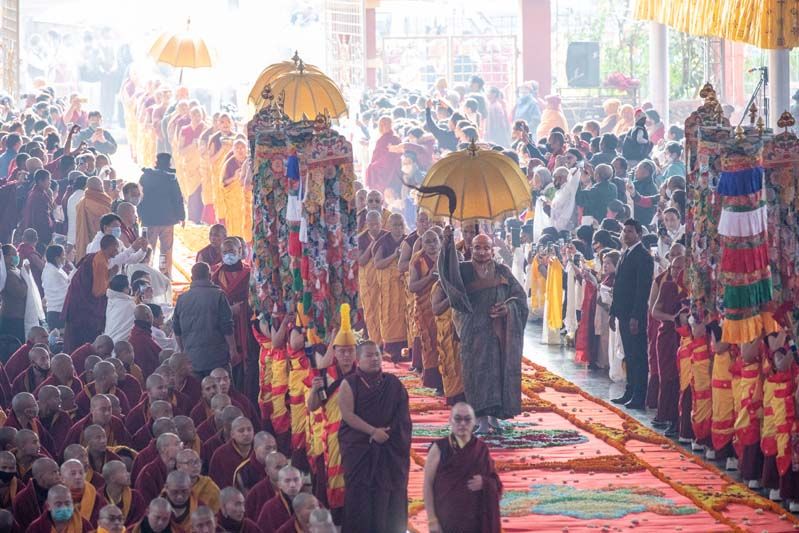Yongey Mingyur Rinpoche on the Four Foundations of Mindfulness Session 4: Even More Beneficial is to Think about Impermanence for Even a Moment
- January 29, 2020
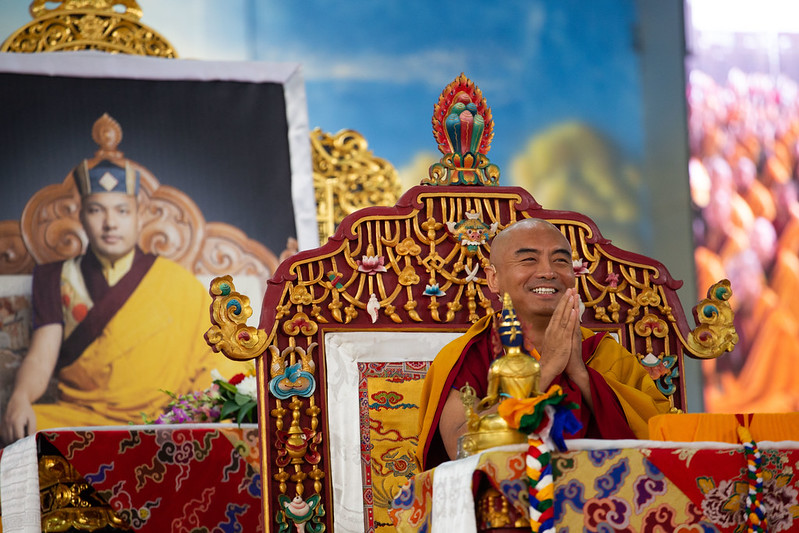
The Pavilion, Bodh Gaya, India
January 29, 2020
Rinpoche began the second day of teachings with a refresher of the previous day’s teachings. He reiterated that the foundation of mindfulness of mind is to rest our mind on the nature of the breath. Whatever the quality of our breath, he reminded us, there is no need to change it. As we rest in the nature of the object as it is, this produces awareness. This awareness becomes a good condition for creating insight. Rinpoche noted, “When we rest without doing any creating or blocking, when we look at the nature of prajna, then the afflictions of ignorance, desire, and hatred begin to be pacified.” He clarified further that the afflictions cannot be truly pacified by shamatha meditation. In order to truly eradicate them, we must have insight.
The primary antidote for afflictions is prajna, and awareness is the opposite of ignorance; hence, that is prajna. This wisdom is actually seeing the object as it is. Whatever thoughts we have – pleasant, unpleasant, or neutral – we do not block these thoughts. When we do not block these thoughts, we begin to pacify aversion. This is extremely important because the differentiations we make whether, ‘I like this’ or ‘I do not like this,’ are very subtle. Often, they are so subtle we fail to even recognize them. When we focus our attention on the breath and do not forget it, even if meditation is ‘good’ or ‘bad’ then the clear mind begins. When this occurs, we begin to train our subtle awareness and the subtle mind of attachment begins to be pacified.
Rinpoche gave a personal example. When he was dealing with an anxiety disorder, the biggest challenge was the fear of the panic attacks. He noted that the more he thought, “I’m not going to be afraid again,” the more afraid he became. This is a good example of why we should not try to block thoughts. Rather, we need to rest the mind on the breath which helps to deal with anxiety disorders or any suffering or pain.
Rinpoche reminded everyone that impermanence, suffering, selflessness, and emptiness are the universal characteristics of insight, common to all three traditions: Theravada, Mahayana, and Vajrayana. While Mahayana emphasizes selflessness and Vajrayana, emptiness, the Foundation Vehicle begins with the insight of impermanence. To begin to realize this, we look at the momentary changes of the breath. Impermanence means looking at the past and future and examining, “What is this?” Rinpoche clarified further, “In every finger snap, there are sixty-four parts and one of those is the present. Other than that, years, months, days, hours, and minutes do not truly exist in the present. They are merely projections of the mind. The actual object in itself does not exist. The past is gone – so, where is it? The future has not happened – so, where is it? What we have is just this moment. One out of sixty-four parts of the instant is an extremely short time. The breath is the same; the body is the same. The hall we are in now, the whole earth, the entire universe is also like this. The sun, moon, stars, and continents change in every instant. Right now, the breath is changing. At the same time, the entire universe changes every instant.” When we focus our attention without being distracted from the breath, Rinpoche emphasized, that is the insight that is common with the Foundation Vehicle.
After reciting refuge, generating bodhicitta, and visualizing Vajradhara, Rinpoche led everyone through a guided meditation practice on the foundation of mindfulness of the body. “As the breath fills the whole body,” he said, “the heart beats – changing at every moment. Focus your attention on the momentary changing heartbeat.” He guided everyone to become aware of the blood circulating through the body, encouraging us to focus on its impermanence, as well as how our flesh, blood, bones, atoms and all substances are changing moment by moment.
As the meditation concluded, Rinpoche asked lively, “How did it go?” He paused and then honed in on the significance of this meditation with an apposite teaching from the Buddha to his disciples Sariputra and Maudgalyayana, “Even if you filled the entire universe with jewels and offered it for seven days, even more beneficial is to think about impermanence for even a moment.” Further underscoring the importance of contemplating impermanence, Rinpoche said, “If you think about hoof prints, the print of an elephant is the greatest. Similar to that, contemplating impermanence is the greatest of all thoughts.”
Rinpoche differentiated between coarse and subtle impermanence. Coarse impermanence refers to the impermanence of continuing change, such as the life-cycle of a flower which grows, wilts, dries, and ceases. The view of subtle impermanence is that from moment to moment whatever arises perishes and every instant it changes.
Holding up a golden-colored object, Rinpoche quizzed the audience, “What is this?” Possible answers were a golden alms bowl, a cup, or a bowl. But, as Rinpoche affixed different parts to the object, it clearly became what we call a vase. Then Rinpoche removed the spout and asked, “Is this the vase?” A vase is made out of many different parts, he explained, so it is not a single, independent thing. Whatever is like a vase, that can be destroyed with a hammer or dissected by the mind, is relative truth, whereas whatever cannot be destroyed is ultimate truth. The nature of the body, then, is comprised of parts that change moment to moment.
After finishing this teaching on the foundation of mindfulness of the body, Rinpoche turned to the foundation of mindfulness of feelings which also has specific and universal characteristics. The specific characteristics are the experiences of what you are feeling and resting in knowing that feeling, whereas the universal characteristics are impermanence and suffering. Rinpoche led everyone in another meditation focused first on feelings in the hands. Everyone held their hands a foot apart as if cupping an invisible ball, and then he had us joining palms together, rubbing our hands slowly, separating them, and pressing them together again. Each step of the way, he asked us to notice any sensation and to relax, noting that there was nothing to change. He instructed us to use our awareness to notice pleasant, unpleasant or neutral sensations.
As the meditation concluded, he asked us whether we found sensations or not. He said, “If it seems you cannot find any sensations at all, then that means your mind rested in non-referentiality. You do not need to make sensations if you did not experience them. If you had an experience that was pleasant, unpleasant or neutral, that is also really good.” When we look at any object and label it as good or bad, it is because a sensation is attached to that object. We are actually attached to the sensation or feeling not to the object itself. He gave as examples drinking a Coke or getting lots of ‘likes’ on a social media post. When a feeling of pleasure fills the entire body, we get attached. Rinpoche asked everyone to take note of the sensations during the tea break and rest with awareness on whatever arises whether drinking tea or standing in line for the restroom! He concluded the session with a jocular reminder that there would be a quiz after the break.
During the tea break, it was announced that although His Holiness Gyalwang Karmapa has not been able to come to Bodh Gaya, he is giving direction both before and throughout the Monlam. His Holiness had requested that The Verses That Saved Sakya from Sickness: A Prayer for Pacifying the Fear of Disease be recited.
Thangtong Gyalpo, also known as Chakzampa, the "Iron Bridge Maker", composed this prayer when there was a great plague in the area of Sakya. By reciting these verses, they were able to pacify the epidemic in Sakya. It is a well-known prayer that His Holiness had translated into Chinese and at Chinese New Year he directed people to recite it in light of the coronavirus.
Now, Rumtek Head Khenpo Kelsang Nyima explained, the Karmapa would like all of us gathered here to make pure aspirations as we recited this prayer together during the tea break. His Holiness transmitted the lung for this prayer through an audio recording he had sent. Following the transmission from His Holiness, Monlam attendees recited the prayer which is found here:
http://www.kagyumonlam.org/images/content/Kagyu-Monlam/pdfs/The-Verses-That-Saved-Sakya.pdf
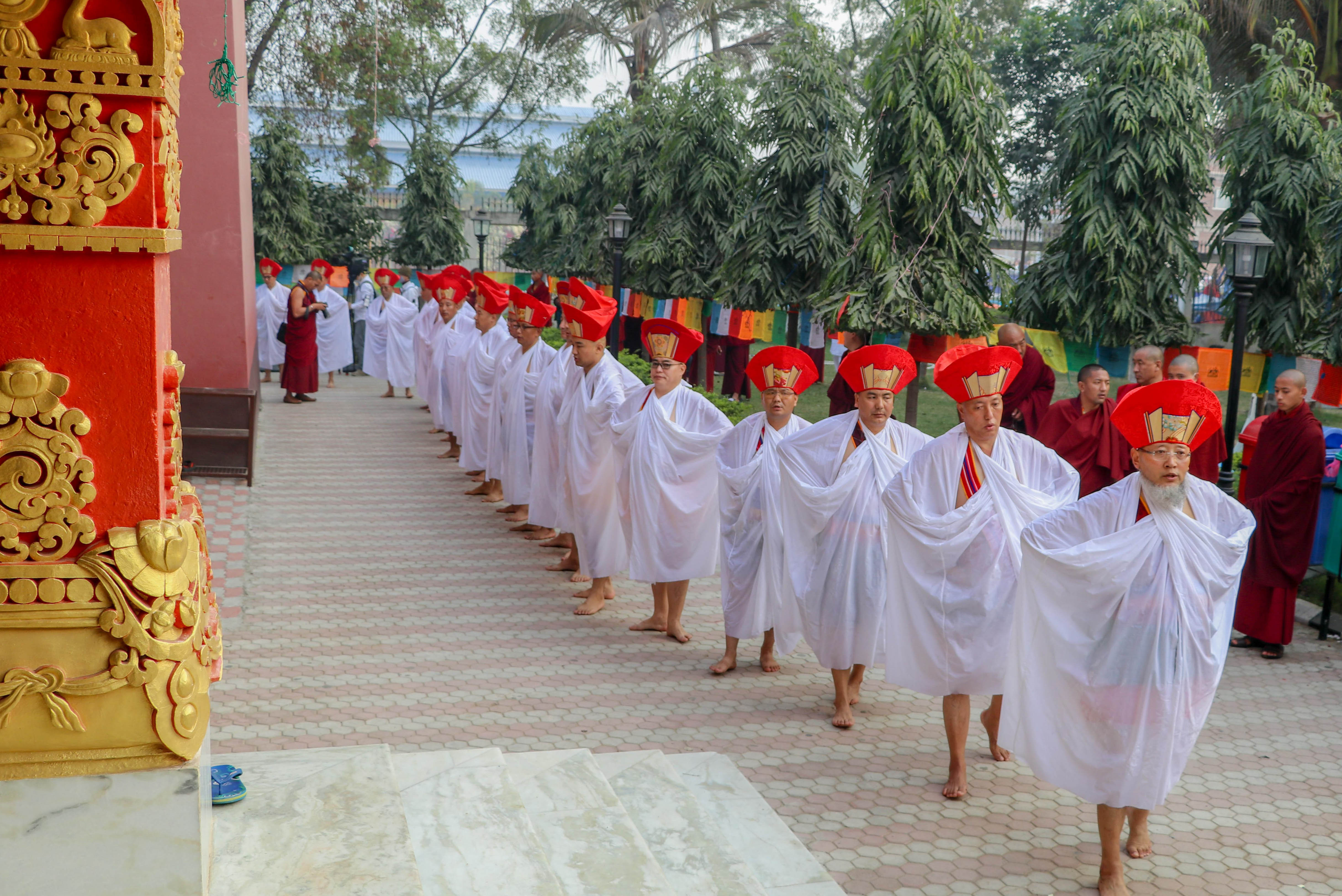
37th Kagyu Monlam Schedule
Tibetan / English / Chinese • French • German • Indonesian • Korean • Polish • Russian • Spanish • Vietnamese
Dharma Teachings
 Meditation Instructions
Meditation Instructions
Recorded during the 37th Kagyu Monlam, Bodhgaya, India. January 28-30, 2020.

